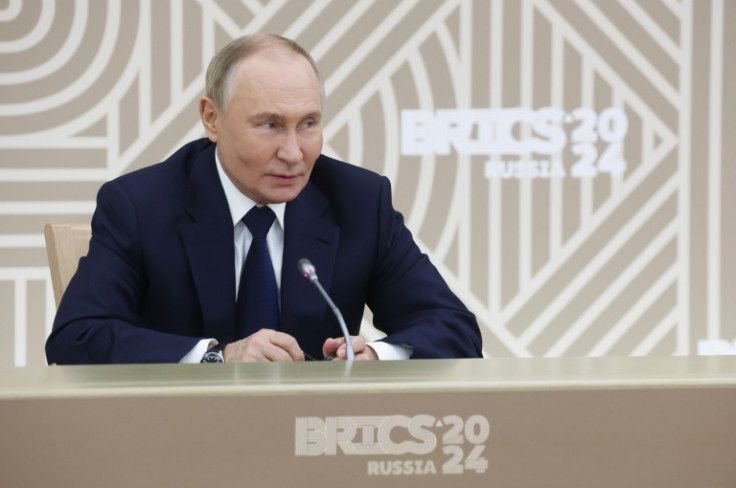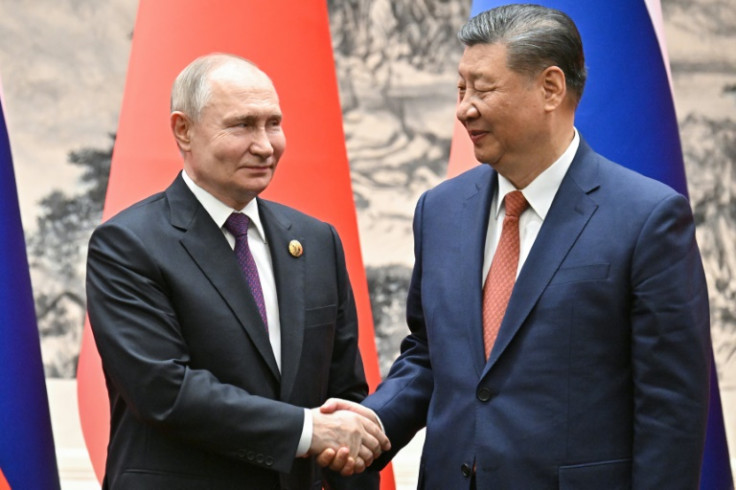
Two dozen world leaders are gathering in Russia on Tuesday for the opening of a summit of the BRICS group, an alliance of emerging economies that the Kremlin hopes will challenge Western "hegemony".
The summit is the biggest such meeting in Russia since it ordered troops into Ukraine and comes as Russian President Vladimir Putin seeks to demonstrate that Western attempts to isolate Moscow over the two-and-a-half-year offensive have failed.
Chinese leader Xi Jinping, Indian Prime Minister Narendra Modi and Turkish President Recep Tayyip Erdogan -- all key partners for Russia -- are scheduled to join the summit, hosted in the city of Kazan from October 22 to 24.
Moscow has made expanding the BRICS group -- an acronym for core members Brazil, Russia, India, China and South Africa -- a pillar of its foreign policy.
The main issues on the agenda include Putin's idea for a BRICS-led payment system to rival SWIFT, an international financial network that Russian banks were cut off from in 2022, as well as the escalating conflict in the Middle East.
The Kremlin has touted the gathering as a diplomatic triumph that will help it build an alliance to challenge Western "hegemony".
The United States has dismissed the idea that BRICS could become a "geopolitical rival" but has expressed concern about Moscow flexing its diplomatic muscle as the Ukraine conflict rages.
Moscow has been steadily advancing on the battlefield in eastern Ukraine this year while strengthening its ties with China, Iran and North Korea -- three of Washington's adversaries.
By gathering the BRICS group in Kazan, the Kremlin "aims to show that not only is Russia not isolated, it has partners and allies," Moscow-based political analyst Konstantin Kalachev told AFP.
The International Criminal Court (ICC) issued arrest warrants for Putin in 2023 over the illegal deportation of children from Ukraine, and the Russian leader abandoned plans to attend the previous summit in ICC member South Africa.
This time round, the Kremlin wants to show an "alternative to Western pressure and that the multipolar world is a reality," Kalachev said, referring to Moscow's efforts to shift power away from the West to other regions.
The Kremlin has said it wants global affairs to be guided by international law, "not on rules that are set by individual states, namely the United States."
"We believe that BRICS is a prototype of multipolarity, a structure uniting the Southern and Eastern hemispheres on the principles of sovereignty and respect for each other," Kremlin aide Yuri Ushakov said.
"What BRICS is doing is gradually -- brick by brick -- building a bridge to a more democratic and just world order," he added.
In Kazan, Putin is set to meet individually with Modi and Xi, as well as the leaders of South Africa and Egypt on Tuesday, followed by separate talks with Erdogan and Iran's President Masoud Pezeshkian on Wednesday.
UN Secretary General Antonio Guterres is also undertaking his first trip to Russia since April 2022 to attend the summit. He will sit down with Putin on Thursday, according to a programme shared by Ushakov.
Ahead of the summit, AFP journalists in the city reported heightened security measures and a visible police presence.
The surrounding Tatarstan region, which is some 1,000 kilometres (620 miles) from the border with Ukraine, has previously been hit by long-range Ukrainian drone attacks.
Movement around the city centre is being limited, residents advised to stay home, and university students moved out of dormitories, local media reported.
The West believes Russia is using the BRICS group to expand its influence and promote its own narratives about the Ukraine conflict.
Ukrainian President Volodymyr Zelensky has warned other countries could feel emboldened if Putin wins on the battlefield in Ukraine.
Starting with four members when it was established in 2009, BRICS has since expanded to include several other emerging nations such as South Africa, Egypt and Iran.
But the group is also rife with internal divisions, including between key members India and China.
Turkey, a NATO member with complex ties to both Moscow and the West, announced in early September that it also wanted to join the bloc.
Brazilian President Luiz Inacio Lula da Silva cancelled his planned trip to the summit at the last minute after suffering a head injury that caused a minor brain hemorrhage.








